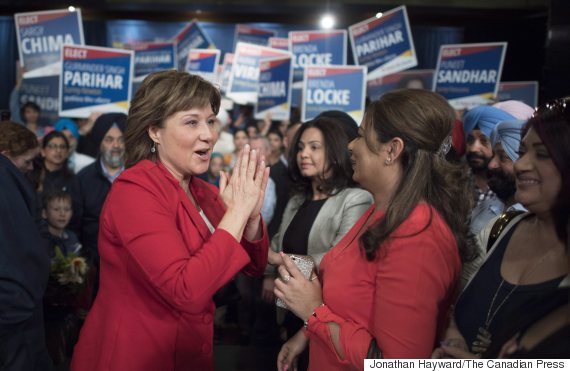— Musings —05.09.2017 07:35 AM
My HuffPo BC election column: twenty-one years ago tonight
[Here in its entirety.]
Twenty-one years ago, we B.C. Liberals were gathered at the Hotel Vancouver, peering up at some big TV screens, shocked by what we were seeing.
It was Election Day in British Columbia, and the returns were coming in. And they didn’t make any sense. At all.
We were ahead, but we were behind, too.
The Gord Campbell-led Liberals had substantially more votes than our principal opponent, the B.C. New Democrats — some 40,000 votes, when they were all counted. We owned the popular vote, right from the moment that the polls closed. We’d end up with three percentage points more than the NDPers, in fact.
But we were still losing.
There was noise behind us: Christy Clark, Mark Marissen and some of their campaign team were swinging down the Hotel Vancouver stairs, cheering. Christy had won a seat in the legislature, and would soon become a star. In a time, she’d become premier, too.
But not tonight. Tonight, the B.C. NDP — much like Donald Trump would do, two decades later — won with less votes. Way less votes. Just as the 2016 Electoral College had perverted the clear will of the American people, a bizarre B.C. electoral system had denied victory to the clear winner of the 1996 race.
 B.C. Liberal Leader Christy Clark greets supporters as she attends a rally during a campaign stop in Surrey, B.C., Sunday, May 7, 2017. (Photo: Jonathan Hayward/The Canadian Press)
B.C. Liberal Leader Christy Clark greets supporters as she attends a rally during a campaign stop in Surrey, B.C., Sunday, May 7, 2017. (Photo: Jonathan Hayward/The Canadian Press)
And now, 21 years later, B.C. returns to the polls tomorrow. And the race is just as tight as it was in 1996.
Clark, having been B.C. Liberal leader since 2011, is well-known quantity. She is upbeat, she is unflappable, and she is one of the best political performers I’ve ever seen. But in B.C., those who won’t vote for her — well, they were never going to vote for her. The fact that she has overseen the strongest economy in Canada — the fact that she has the lowest unemployment rate in the country — is irrelevant to her hardcore opposition. They dislike her.
The embodiment of their dislike is their (latest) champion, B.C. NDP leader John Horgan. Horgan is the kind of guy who shoots his mouth off at family gatherings, offering strong opinions when none are wanted. He’s kind of like the uncle who won’t ever shut up.
Evidence of this came early in the campaign. At the very first leaders’ debate, Horgan — after talking over Clark repeatedly — Horgan leered at the premier and actually said this: “I’ll watch you for a while. I know you like that.”
Horgan was “angry,” lacked “respect” and had the debate’s most “regrettable” moment.
The next morning, the National Post put his words in a headline on their front page.
“That regrettable moment in the B.C. leaders debate,” noted the Post, unamused. Horgan was “angry,” lacked “respect” and had the debate’s most “regrettable” moment, the newspaper reported.
It was also true.
The entire campaign kind of was like that. Christy was upbeat and unflappable all over the hustings. Horgan was a boor, and had more policy positions than the Kama Sutra. And the B.C. Green Party’s leader, Andrew Weaver, generally impressed soft-NDP voters with his demeanor and his candour.
If the B.C. NDP loses — as some now predict they might, despite having been ahead by double digits just a few weeks ago — it will be partly because Weaver’s Greens stole away voters who were unimpressed by the B.C. NDP leader’s total inability to control his temper and himself.
The B.C. Liberals have run the better campaign. Sure, they are a coalition party, made up of Liberals and Conservatives and former Socreds. Sure, they’ve been in power for a long time — since 2001, when Gord Campbell reduced the NDP to just two seats. Sure, Clark never seems to stop smiling — that has to be irritating to pious and preachy NDPers who want to discredit her.
Can the B.C. NDP win tomorrow night? Sure they can. It’s a tight race. The media has been gunning for Christy Clark. Some British Columbians have forgotten — inexplicably, incredibly — that they live in the province that most other Canadians want to live in.
But — as they peer up at those big TV screens at the B.C. Liberal 2017 election night party — here’s hoping there isn’t a repeat of 1996.
You know: win more votes, but still lose.


“Just as the 2016 Electoral College had perverted the clear will of the American people..” This statement shows a lack of knowledge of the US electoral system. As a “union” of states that in many cases operates differently, the US founders wanted to prevent larger states from having a disproportionate sway over the running of the country. The situation is the same today as it was almost two and half centuries ago. Hillary Clinton won the popular vote because she was able to run up the score in California and New York. She clearly lost the majority of the states, and made tactical error by not (under) campaigning in that states like Wisconsin, Michigan and Pennsylvania that had in more recent times voted Democratic. You can make an argument that you don’t like a system like that, but it is hardly “perverting the clear will of the American people” as you wrote. No system is ever perfect, but the US one certainly gives more balance to smaller states that are considered equal units on a federal level.